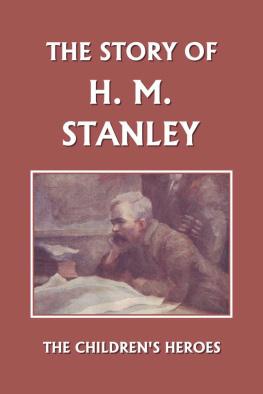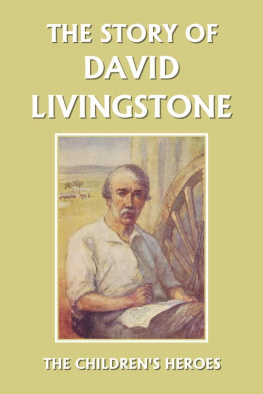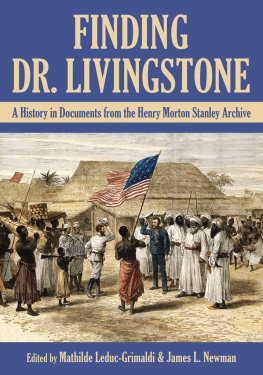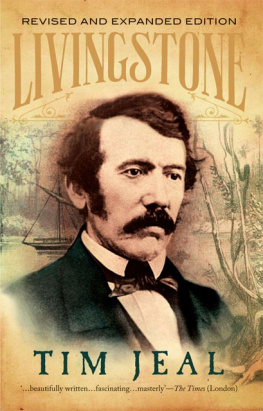The Story of H. M. Stanley
by
Vautier Golding
Yesterday's Classics
Chapel Hill, North Carolina
Cover and Arrangement 2010 Yesterday's Classics, LLC
All rights reserved. No part of this book may be reproduced or retransmitted in any form or by any means without the written permission of the publisher.
This edition, first published in 2010 by Yesterday's Classics, an imprint of Yesterday's Classics, LLC, is an unabridged republication of the work originally published by T. C. & E. C. Jack, Ltd. in 1906. This title is available in a print edition (ISBN 978-1-59915-230-1).
Yesterday's Classics, LLC
PO Box 3418
Chapel Hill, NC 27515
Yesterday's Classics
Yesterday's Classics republishes classic books for children from the golden age of children's literature, the era from 1880 to 1920. Many of our titles are offered in high-quality paperback editions, with text cast in modern easy-to-read type for today's readers. The illustrations from the original volumes are included except in those few cases where the quality of the original images is too low to make their reproduction feasible. Unless specified otherwise, color illustrations in the original volumes are rendered in black and white in our print editions.
Proem
To Sweetheart Joan
Smile yet again, my sweetheart Joan,
Ere night and Nursies doom
Shall leave these orphand eyes alone
To chase the twilight gloom;
Good-night! Another dawn shall speed
That we in ardour blest
May follow brave Uleydis lead,
And find the hidden West;
And as, with tender lip and chaste
Beyond this earths alloy,
For one brief time you bid me taste
The dear Madonnas joy,
Lend me your innocence to pray
The thing her babe has told,
That, though the head be Autumn grey,
The heart be never old.
Vautier Golding.
Bournville, Sept. 1906
Contents
CHAPTER I
Early Years
T HE good folk of Denbigh, in North Wales, proudly claim their town to be the birthplace of the great explorer, Sir H. M. Stanley. Close by the ruin of its old Castle, they point out the little Welsh cottage where his life began; and thus they tell the story of his childhood before he left his country and changed his name.
He was born in 1841, and baptized in Tremeirchon Church as John Rowlands, which is the English way of writing the Welsh name Rollant. His father, John Rollant, a farmer's son, died when the wee child was only two years old; and his mother, who afterwards became Mrs. Jones, left him to the care of a nurse.
From that time a good and kindly woman, Mrs. Price, was a second mother to the child, and she brought him up with her own children happily enough. Her husband had charge of the Denbigh bowling-green; and while he worked at the well-kept lawn, his sturdy little foster-son ran about all day in the open air. Every one tried as much as possible to be kind to him, and the simple and homely peasant life made him grow up hardy, active, and strong.
When at length he was old enough to leave his new home, he was sent to a boarding-school at St. Asaph. His foster-brother, Richard Price, carried the little fellow there on his shoulders, while a former nurse, Harriet Jones, went part of the way as an escort. St. Asaph was farther than John had ever yet been, and the way there must have seemed a long and strange pilgrimage to his childish mind. No doubt in after years, when he made his own toilsome way through prairie, forest, and desert, he gratefully remembered the kind folk who tried to make his first journey as easy and happy as could be.
On reaching the school, Richard Price handed over his charge and said good-bye, and John Rowlands was left to make his own way in his new surroundings. It was a severe change to come from the special love and care of his cottage home, and then to find himself just one in a crowd of boys who did not mind in the least whether he was happy or not. John, however, soon learnt how to look after himself. He was ready and keen in his work, and his pluck and vigour made him a leader among his schoolfellows. On the whole, his life at St. Asaph seems to have been a happy one, though his quick temper and masterful ways often made trouble for him.
After ten years at St. Asaph John went, at the age of sixteen, to be a pupil teacher under his cousin, who kept the National School at Mold. This arrangement, however, was not a success. The cousin appears to have been ill-natured and spiteful, and he tried in a mean way to put upon John more than his fair share of work. The boy's temper rebelled against such treatment, and there was a quarrel, which John ended by walking out of the house to fight his own way in the world.
To be alone on the highway, without a home, without a friend, and with only a few pence in his pocket, was a grim and serious plight for a lad of sixteen. John Rowlands, however, does not seem to have had any trouble at all in making up his mind what next to do, for he at once took the road to Liverpool. He had heard and read of young emigrants who had gone, poor and unknown, to America, and had come back rich and famous; and he determined to see if he could not do the same.
It was a long and weary tramp; and, at the end of it, there was no hope of a warm welcome, a good meal, and a comfortable bed. The great town of Liverpool, too, was large enough to swallow a hundred Denbighs; and its long streets of large buildings struck a cold and cheerless gloom into the heart of the lonely outcast. He asked his way through the town to the docks; and there he wandered about and watched the shipping at the wharves and in the Mersey tideway, till hunger and fatigue drove him back into the streets. Here a few pence bought him all the food he could afford; and then, when the dead of night made all things quiet, he stole up a side alley and slept in the shadow of a deep doorway.
Next morning he again went down to the docks, and found a trading ship about to start on her return voyage to New Orleans, with a number of emigrants on board. It was, of course, quite out of the question for John to pay his fare as an emigrant, and he wistfully watched the forlorn and homesick exiles troop over the gangway to their cramped and comfortless quarters on the lower deck. One or two of them were carrying in a single bundle all they had in the world, and John felt that even these were better off than himself. Then an idea struck him, and he asked some of the sailors if any more hands were wanted for the ship's crew. They took him to the captain, who liked the look of him, and said he might come on board as a cabin-boy and give work instead of money for his passage to America.
John thought himself in luck's way, though at first he could hardly believe it true. Soon, however, the ship was cast loose and hauled off the quay; then her bows slowly swung round to seaward, and she moved down the tideway, across the Mersey bar, and out to the open sea. In a few hours John saw the blue hills of his native land sink out of sight in the distance, and then he began to feel that he had lost a home.
The ship pitched and rolled as she plunged over the waves; and John, who was ordered here there and everywhere to do all kinds of drudgery, found it hard to keep his feet. But, however he felt, his work had to be done; and, though he often wished himself ashore, he struggled pluckily on. In reality he was better off than the emigrants. His work kept his mind off his own woes; and thus he soon found his "sea-legs," while many of the others lay groaning about the deck.











